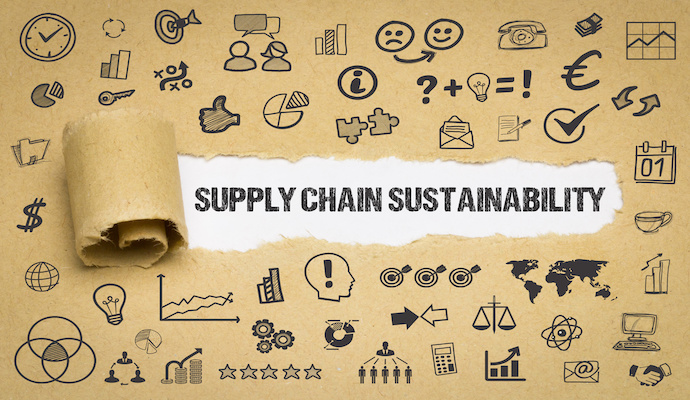Strategies for Sustainability in the Global Pharmaceutical Supply Chain
Sustainable strategies are essential for the global pharmaceutical industry's supply chain to minimize its environmental impact, reduce greenhouse gas emissions, preserve natural resources, and address growing concerns about climate change.

Source: Adobe Stock
- The pharmaceutical industry and its global supply chain play a critical role in the healthcare system, but it also significantly impacts the environment. From the extraction of raw materials to the disposal of drugs, the industry's chain of operations has a considerable carbon footprint. The need for sustainability in the pharmaceutical industry has become more apparent in recent years as global concerns about climate change and environmental degradation continue to grow.
Sustainability in the pharmaceutical industry refers to the industry's ability to meet the needs of the present without compromising the ability of future generations to meet their own needs. The industry must find ways to reduce its impact on the environment, conserve natural resources, and promote sustainable development. This article explores the concept of sustainability in the pharmaceutical industry and discusses some of the initiatives companies are taking to promote sustainability.
The influence of climate change on human health and healthcare systems is evident; however, actions by the pharmaceutical industry have heavily contributed to the climate crisis. Although it may not receive as much recognition as other industries, the pharmaceutical sector is accountable for 4.4% of worldwide emissions — and if no action is taken — its carbon dioxide emissions are predicted to triple by 2050.
In 2019, for every $1 million in revenue, the pharmaceutical industry produced 48.55 tons of CO₂ equivalent, which is 55% more than the automotive industry's 31.4 tons per $1 million in revenue generated in the same year.
Sustainable Manufacturing Practices
One of the most significant contributors to the pharmaceutical industry's carbon footprint is the production and transportation of drugs and other therapeutics. Pharmaceutical companies are increasingly adopting sustainable manufacturing practices, such as using renewable energy sources, reducing water usage, and optimizing production processes to minimize waste. Companies are also exploring alternative transportation methods, such as using electric or hybrid vehicles to reduce emissions from transportation.
Waste Reduction
Because the pharmaceutical industry generates a significant amount of waste that can be harmful to the environment and human health, companies are taking steps to reduce waste by implementing sustainable packaging solutions, using recyclable materials, and reducing the size of packaging.
For example, Abbott’s latest continuous glucose monitor (CGM) sensor, FreeStyle Libre 3, was designed with sustainability in mind. In this next-generation design, the system’s total volume was reduced by more than 70%, including a 41% reduction in plastic use and a 43% decrease in carton paper.
Green Chemistry
Organizations are also working to reduce the number of excess products and byproducts generated during the manufacturing process using green chemistry.
Green chemistry is a more sustainable approach to chemical synthesis that seeks to minimize or eliminate hazardous chemicals and reduce waste during the manufacturing process. Pharmaceutical companies are exploring green chemistry solutions to reduce the environmental impact of drug production.
By using safer and more sustainable chemicals, companies can reduce the amount of waste generated during manufacturing and minimize the risk of harm to human health and the environment.
Water Conservation
Water is a critical resource in the pharmaceutical industry, used for everything from drug production to cleaning equipment. To reduce water usage, companies are implementing sustainable water management practices, such as using water-efficient equipment, recycling water, and treating wastewater for reuse. Some companies are also investing in technologies that enable them to use seawater or brackish water in manufacturing processes, reducing their reliance on freshwater resources.
In 2010, Abbott adopted a method to reduce water usage by 40% before 2011. The company achieved remarkable outcomes, as it had already reduced water consumption by 37% by the end of 2009, saving up to 1 billion gallons of water annually.
Renewable Energy
Pharmaceutical companies are increasingly investing in renewable energy sources, such as solar, wind, and geothermal, to reduce their carbon footprint. Many companies are installing solar panels on their manufacturing facilities or sourcing energy from wind farms. Some companies are also using geothermal energy to power their facilities or to heat and cool buildings.
For example, Amgen’s newest biomanufacturing plant in New Albany, Ohio, will be the company’s most efficient and sustainable facility once it is complete in 2024. The company's green building will include solar panels, LED lighting, energy-efficient technology, and other sustainable equipment.
Stakeholder Engagement
Increasing sustainability in the pharmaceutical industry requires engagement with a range of stakeholders, including employees, suppliers, regulators, and customers. Companies can work with suppliers to ensure that they are meeting sustainability standards and can collaborate with regulators to ensure that they meet environmental regulations. Additionally, companies can engage with customers to educate them about sustainable practices and encourage them to make sustainable choices.
Most Sustainable Global Pharmaceutical Companies
According to the Corporate Knights' Global 100 (G100) Most Sustainable Corporations index, the most sustainable pharmaceutical companies as of 2022 include Eisai Co Ltd., Novozymes A/S, Sanofi S/A, AstraZeneca PLC, and Biogen Inc.

Source: Xtelligent Healthcare Media
These companies were evaluated based on various sustainability indicators such as carbon and water productivity, clean revenue, and board and management diversity.
Most Sustainable Biopharmaceutical Companies
According to a 2009 report, Abbott Labs, Johnson & Johnson, AstraZeneca, Merck/Schering-Plough, Bayer Healthcare, Novartis, Bristol-Myers Squibb, Pfizer/Wyeth, Eli Lilly, Roche/ Genentech, GlaxoSmithKline, and Sanofi were the top 12 greenest biopharma companies. This report drew upon numerous well-vetted sources, such as the Carbon Disclosure Project, the US Environmental Protection Agency, Newsweek magazine, and the Wall Street Journal Sustainability Index.
Greening the Supply Chain
Sustainability is a critical issue facing the pharmaceutical industry, and all companies must take steps to reduce their impact on the environment. From reducing carbon emissions to implementing sustainable water management practices, companies can explore a range of solutions to promote sustainability.
As global concerns about climate change and environmental degradation continue to grow, the pharmaceutical industry must prioritize sustainability to ensure a sustainable future for generations to come.
